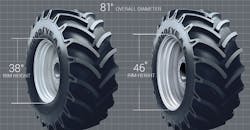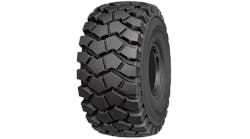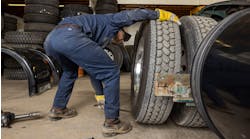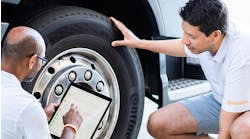Following the first three quarters of 2014, Titan International Inc. Chairman and CEO Morry Taylor explained to the investment community how his company would rebound from a net loss of $27.4 million on net sales of $1.5 billion. “Titan will continue to strengthen our path toward growth and improved performance as we enter into 2015 with cost reductions (which will include trimming its global workforce) and new product offerings, including the LSW wheel/tire campaign,” he said.
That was for Wall Street’s benefit. What can the farm tire dealer expect from Titan in 2015? To find out, Modern Tire Dealer asked Ag Product Manager Scott Sloan to share his outlook on the agricultural market, in terms of the economic environment, tire technology and new products.
Titan, with its namesake and Goodyear brands, accounts for 54% and 39% of the domestic original equipment bias and radial rear farm tire markets, respectively. It also is a major player in both replacement rear farm tire market segments, and the major supplier of OE and replacement small farm tires.
MTD: As 2014 wound down, crop yields were high, commodity prices were low and farm equipment sales were steady, no thanks to a recent change in the Internal Revenue Service tax code. Do these factors bode well for farm tire sales in 2015?
Sloan: Commodity prices will certainly slow the of sales of new tractors and we will no doubt feel some of that in our OE sales. The upside is that if producers are not buying new tractors, they are going to be keeping their current ones and fixing those up. Re-shoeing the tractor with a new set of tires would be a logical investment. That for us means instead of the OE sale we will pick up in the aftermarket.
MTD: Does the farm tire market have any momentum entering 2015?
Sloan: The market for the beginning of 2015 will be slow to start. Late harvest along with the inclement weather last fall pushed producers’ projects back a few months. We saw a tremendous increase in the demand of wide flotation tires last fall due to the extremely wet conditions.
MTD: What are the biggest trends in the farm tire market?
Sloan: The only things going on in the industry at the moment are IF/VF-CFO tire technology and Titan’s very own LSW technology. IF (Increased Flexion)/VF (Very High Flexion) technology allows the tire to carry the same load at lower inflation pressures. CFO stands for Cyclic Field Operation, which is an additional bump of 55% in the capacity of that tire in a cyclic application under 10 mph given to IF tires. Acceptance and understanding of the technology by producers in the marketplace is mediocre at best. This technology has been pushed by the OE’s to address load and inflation restrictions due to the fact that many equipment manufacturers continue to build machines larger and heavier without changing the machine architecture to increase the envelope to allow for the use of larger tires. If the tire size can’t be increased, inflation pressures need to be increased to carry a larger load.
All tire manufactures carry their lines of IF and VF tires. This concept has been around for a number of years. I consider this a “me to” technology, meaning there is nothing unique to any one company. Every tire company offers it. Success of this technology is reliant on the producer or end user properly maintaining inflation pressures of the tires.
The real industry game changer is Titan’s very own LSW (low sidewall) technology. With this technology, we increase the wheel diameter while keeping the tire the same OD. This reduces the height of the sidewall of the tire and dramatically improves the performance of whatever piece of equipment it is installed on. Tractors, sprayers and combines are just some of the markets we have been working in. We have been heavily marketing this technology for the past three years, and our market research indicates that more end users know and understand LSW technology than they know or understand IF/VF technology. LSW is a revolutionary technology that will continue to gain market share as we move forward.
Based on the field success of the LSW, OE’s such as John Deere have made it available to producers when they order their tractors. ■



